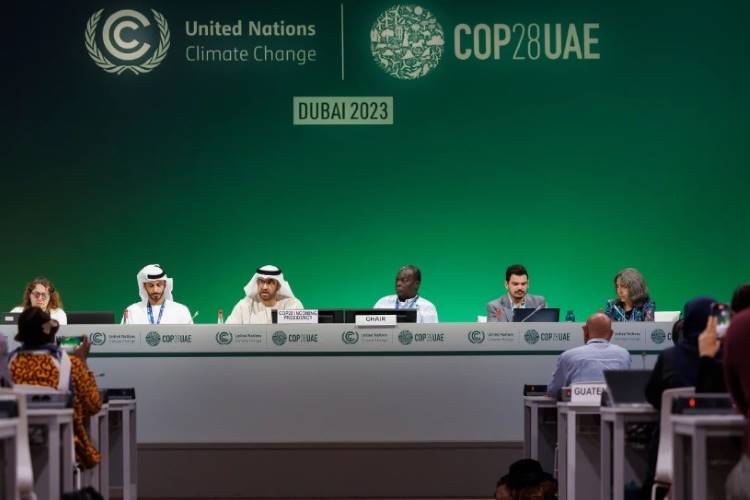
The recently concluded COP28 in Dubai marks a significant milestone in the ongoing global dialogue on climate change, initiated by the United Nations Framework Convention on Climate Change (UNFCCC) since its inception in 1994. This year’s conference was particularly notable for its comprehensive Global Stock Taking (GST) exercise, aimed at evaluating the world’s progress in addressing climate change through emission reduction, green technology adoption, green energy initiatives, and the provisioning of concessional climate finance. This assessment, crucial in keeping nations accountable, also serves as a catalyst to elevate their climate ambitions.
2023, a year marked by unprecedented climate extremes – from scorching heatwaves in North America and Europe, rampant wildfires in Canada, floods in India and Libya, to severe drought in Africa – underscores the pressing need for concerted global climate action. These events are stark reminders of the long-term impacts of human activities, particularly fossil fuel consumption, on our planet. The repercussions are alarming: increased greenhouse gas emissions, global warming, extreme weather events, and a rapid decline in biodiversity. The World Meteorological Organisation’s observation of the 2011-2020 decade as one of economic losses, despite fewer deaths due to improved disaster management, adds a grim note to this reality.
READ | Cryptocurrency regulation: India awakens to blockchain’s potential
COP28: Landmark decisions
A pivotal outcome of COP28 is the Global Cooling Pledge, which targets a 68% reduction in cooling emissions by 2050. This is a significant commitment, considering the projection of cooling appliance numbers skyrocketing from 3.6 billion to 9.5 billion by 2050. The conference also made strides in climate finance, a crucial aspect of enabling developing countries to achieve net-zero emissions. The establishment of a Loss and Damage Fund (L and D), a three-decade-old demand, is a major breakthrough.
This fund is designed to aid countries severely affected by climate change in reducing emissions, adopting green technologies, and providing financial support for loss and damage caused by climate change. The financial commitments from various nations, including the host UAE, Germany, the US, and the European Union, signify a collective acknowledgment of the need for substantial support to developing countries.
The trajectory of COP meetings since 1995 reveals a significant evolution from exclusive bureaucratic gatherings to more inclusive forums involving a diverse range of stakeholders, including indigenous people and various lobbyists. COP28’s review under GST emphasises the necessity for countries to submit heightened emissions reduction targets by mid-2025, ahead of COP 30, with the overarching goal of limiting global warming to 1.5°C above pre-industrial levels.
While COP28 witnessed greater inclusivity, the voices of indigenous communities, the most impacted by climate change, remained relatively muffled. Recognising and integrating their traditional ecological knowledge, coupled with stronger representation in decision-making, is crucial for effective climate action. Programs showcasing their adaptation strategies and promoting knowledge exchange can provide valuable lessons for global sustainability.
Complexity of fossil fuel dependency
A contentious issue at COP28 was the continued reliance on fossil fuels, with coal being singled out for a “phasedown.” The statement by the President of COP28, who is also the industry Minister of UAE and Head of ADNOC, questioning the science behind cutting back on fossil fuels, reflects the complex interplay of economic interests and environmental imperatives. The presence of a significantly higher number of fuel lobbyists compared to previous conferences further complicates this dynamic.
The revised text of the Global Goal of Adaptation (GGA) focuses on significantly reducing climate-induced water scarcity. However, the lack of provision for adequate financial support remains a critical gap. The stark disparity in historical emissions between the global North and South, and the varying capacities of countries to phase out fossil fuels, further exacerbates the challenge of reaching a consensus on climate goals.
The focus on a “phasedown” of fossil fuels raises concerns about a just transition for communities dependent on these industries. COP28 lacked substantial concrete plans to ensure economic security and reskilling opportunities for affected workers. Addressing equity concerns and ensuring a fair distribution of the costs and benefits of climate action are vital for garnering wider support and preventing environmental injustices.
COP28, while making notable strides, also highlights the immense challenges that lie ahead in the global fight against climate change. The success of these efforts hinges not only on the commitments made by governments but also on the active participation of youth, NGOs, political parties, and experts in raising awareness and implementing climate-resilient projects. The conference serves as a reminder that the path to averting climate catastrophes requires a unified and concerted effort from all stakeholders across the globe.
Embracing technological advancements and fostering international collaboration in clean energy development can accelerate green growth and emissions reduction. COP28 could have done more to showcase and incentivise innovative solutions across sectors like renewable energy, energy efficiency, and carbon capture and storage. By harnessing the power of technology and innovation, we can overcome economic obstacles and pave the way for a sustainable future.
Dr Ravindran AM is an economist based in Kochi. He has more than three decades of academic and research experience with institutions such as CUSAT, Central University of Kerala, Cabinet Secretariat - New Delhi, and Directorate of Higher Education Pondicherry.

